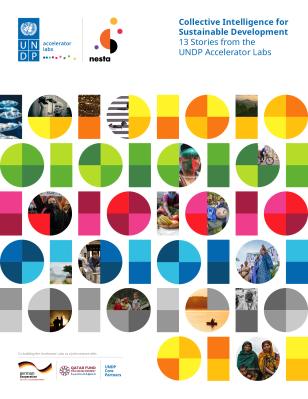Collective Intelligence for Sustainable Development: 13 Stories from the UNDP Accelerator Labs

Collective Intelligence for Sustainable Development: 13 Stories from the UNDP Accelerator Labs
May 13, 2021
Authors: Aleks Berditchevskaia, Kathy Peach, Gina Lucarelli, Mirko Ebelshaeuser.
13 Stories from the UNDP Accelerator Labs is the second report as part of our Collective Intelligence for Sustainable Development series. It offers a deep dive into how collective intelligence is being used by the UNDP Accelerator Labs – from participatory sensing to understand the informal economy around waste in Viet Nam to combining multiple datasets to tackle gender-based violence in Mexico. It summarizes some of the successes to be built on, and common challenges to be addressed in order to mainstream collective intelligence for the SDGs.
The thirteen case studies in this report illustrate how UNDP’s network of Accelerator Labs have begun using collective intelligence to tackle the Sustainable Development Goals:
- Real-time monitoring of the environment: Examples from Argentina and Ukraine show how citizen science, crowdsourcing and in-situ or remote sensing methods (such as satellites) complement existing ways of monitoring the state of environments to fill data gaps in environmental monitoring, as well as stimulating policy and community action.
- Understanding and working with complex systems: In five case studies from Lao PDR, Serbia, Tanzania, Viet Nam and Zimbabwe we demonstrate how collective intelligence is helping policy makers and development organizations to visualize the dynamics of complex systems to uncover insights that have previously been hidden and understand the experiences of diverse or changing populations.
- Distributed problem solving: Organisations are tapping into people’s problem solving capabilities to make progress on issues where there is a lack of established solutions and practices, or when locally-appropriate solutions are in high demand. Examples from Bosnia and Herzegovina, Colombia, Ecuador
and Guinea Bissau show how collective intelligence has helped in the wake of the COVID-19 pandemic. - New forms of accountability and governance: Two early-stage case studies from Mexico demonstrate how combining open datasets or making sense of data crowdsourced from civil servants using AI can be used to evaluate the success and stimulate improvement of government programmes.
If we hope to get closer to achieving the global goals over the next decade, it will be necessary to mobilize intelligence of all kinds to better understand problems, broaden the range of effective solutions, and implement new ideas more effectively.

 Locations
Locations




